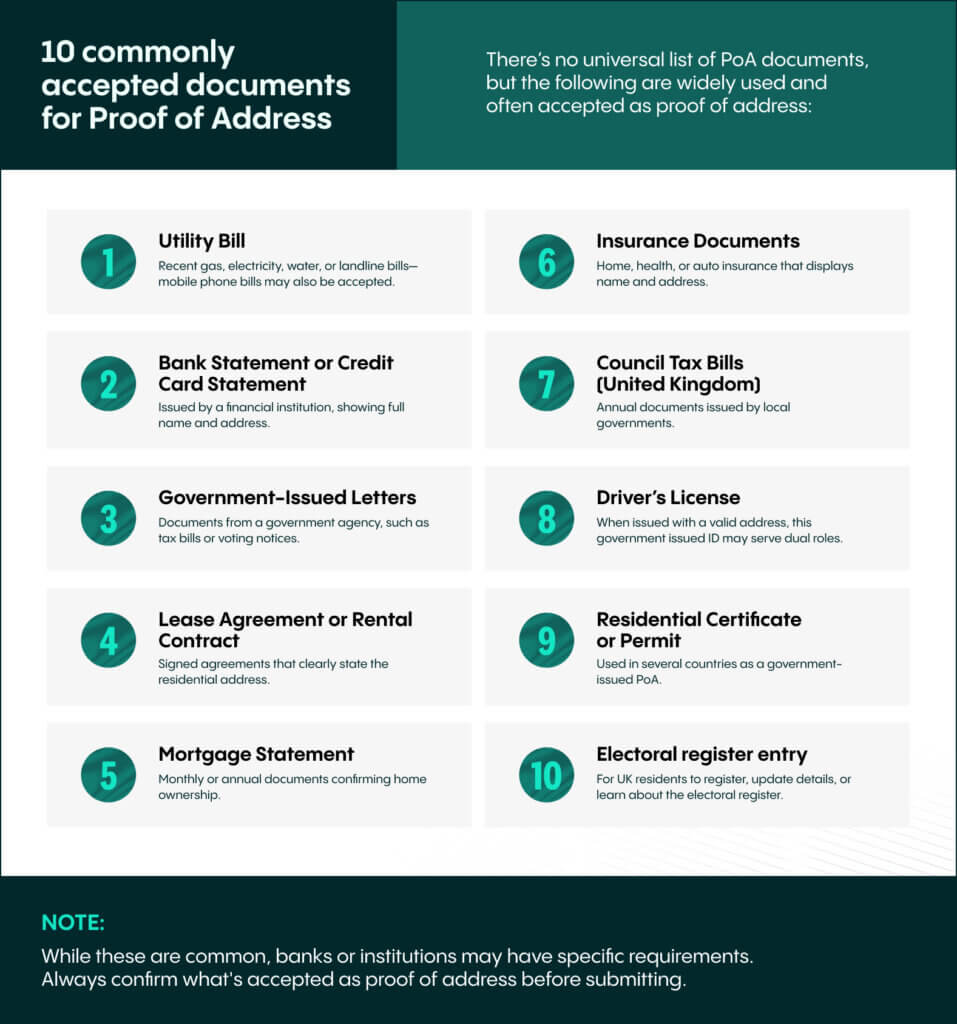KYC Article
10 common Proof of Address documents for KYC & AML, and why they matter for compliance teams
Address verification is key to meeting compliance standards. This quick guide outlines the most accepted Proof of Address documents and highlights why getting it right is critical for KYC and AML teams.
Verifying an address: More than just a document
At first glance, verifying someone’s residential address might seem simple. However, when onboarding thousands—or even millions—of users globally, staying compliant with Know Your Customer (KYC) and Anti-Money Laundering (AML) regulations adds layers of complexity.
Whether you’re designing onboarding flows, selecting a vendor, or optimizing audits, knowing which documents qualify as valid proof of address is foundational. This guide explores 10 commonly accepted documents for proof of address and explains why identity verification at scale requires more than just manual review.
What is Proof of Address?
Proof of Address (PoA) is a fundamental document used to confirm an individual’s residential address. It’s a vital part of identity verification processes for institutions subject to AML and KYC requirements. Regulatory bodies request it to prevent financial crime, identity theft, and fraud.
Though it may seem straightforward—submit a document with a name and address—what’s accepted as proof of address can vary significantly by jurisdiction, and sometimes even by use case.
Note: “Proof of Address” and “Proof of Residency” are often used interchangeably. However, proof of residency may relate to legal immigration status, while a PoA confirms one’s location of residence.
10 commonly accepted documents for Proof of Address
There’s no universal list of PoA documents, but the following are widely used and often accepted as proof of address:

- Utility Bill
Recent gas, electricity, water, or landline bills—mobile phone bills may also be accepted. - Bank Statement or Credit Card Statement
Issued by a financial institution, showing full name and address. - Government-Issued Letters
Documents from a government agency, such as tax bills or voting notices. - Lease Agreement or Rental Contract
Signed agreements that clearly state the residential address. - Mortgage Statement
Monthly or annual documents confirming home ownership. - Insurance Documents
Home, health, or auto insurance that displays name and address. - Council Tax Bills (UK)
Annual documents issued by local governments. - Driver’s License
When issued with a valid address, this government issued ID may serve dual roles. - Residential Certificate or Permit
Used in several countries as a government-issued PoA. - Electoral register entry
For UK residents who need to register to vote, update their details, or understand how their information is used on the electoral register.
Note: While these are common, banks or institutions may have specific requirements. Always confirm what’s accepted as proof of address before submitting.
Why verifying Proof of Address isn’t simple
Even the most standard-looking ID cards or utility bills can pose challenges. Compliance teams face several hurdles:
- Document variability: Formats vary across institutions and countries.
- Falsification & forgery: Fraudsters manipulate government-issued documents or bills bank statements.
- Language barriers: Global submissions may include non-Latin scripts.
- Incomplete or illegible images: Poor scans often miss essential details.
- Timeliness: The accepted validity period for documents varies depending on the country, document type, and industry regulations. It can range from 30 days to up to one year.
These factors complicate the identity verification process and inflate operational costs.
The compliance dilemma: Speed vs. security
Fraud and compliance teams must balance proof of identity and address accuracy with a seamless user experience. In fast-paced sectors like fintech, crypto, and gambling, every second matters.
Manual review of documents for proof of address doesn’t scale. That’s why AI-powered identity verification tools are essential for compliance.
Key features for scalable PoA checks:
- Document classification
- Multi-language OCR
- AI-powered fraud detection
- Secure audit trails

The Veriff solution: AI-powered Proof of Address Verification
Veriff’s Proof of Address suite simplifies compliance with two scalable products:
1. Proof of Address (Standard)
Automates classification, and tamper detection for uploaded PoA documents.
2. Proof of Address Verification (Non-document-based)
Verifies residential data via trusted databases—no upload needed.
🎥 Watch a demo: Veriff PoA Video
Key features of Veriff PoA include:
- Rapid results: response with less than 30 seconds, improving onboarding speed and reducing user drop-off
- Global reach: recognizes documents in over 40 languages across major global scripts, including Arabic, Cyrillic, Japanese, and Latin.
- Document tamper detection: advanced, multi-layered checks detect signs of tampered, fake, or reused documents to reduce the risk of fraud.
- Non-document-based verification: this option verifies addresses against trusted third-party databases, reducing the need for document uploads.
- Address validation: This powerful add-on confirms that the address extracted from the PoA document is a genuine, real-world location. It also confirms the country and identifies the address type (e.g., residential, business, P.O. Box), adding a critical layer of verification.
- Address matching: This feature enriches our PoA offering by confirming that the address on the document matches the one provided by the user during onboarding. It normalizes addresses (e.g., “St.” to “Street”) and performs a component-level comparison to ensure high accuracy and avoid false negatives from simple formatting differences.
- Integration flexibility: the solution can be incorporated into existing onboarding processes or used for standalone checks.
These product enhancements significantly boost the reliability and completeness of our address verification process — giving compliance teams and businesses a far stronger foundation for KYC/AML checks. By combining document-based proofs (like utility bills, bank statements, government letters or rental agreements) with advanced validation methods — including tamper detection, multi-language OCR, and cross-referencing with trusted databases — the process moves from a simple “upload and hope it’s correct” to a robust, scalable system that works globally. The result is cleaner, more accurate customer data and fewer false positives or rejections, which means smoother onboarding, better risk management, and greater confidence for customers in the information they collect.
“As industries race toward digital transformation, proof of address checks often remain manual and slow, yet it’s an important step in building trust and meeting regulations,” explained Oana Barbacaru, Senior Product Manager at Veriff. “Our new AI-based solution delivers a decision in less than 30 seconds, with top-tier accuracy and built-in fraud prevention. It’s reliable, fast, reduces friction – built for the future of KYC,” she added.
Oana Barbacaru, Senior Product Manager at Veriff:

Our new AI-based Proof of Address solution is reliable, fast, reduces friction – built for the future of KYC.

Veriff PoA can be applied to use cases such as:
- Customer onboarding in banking, fintech, and gaming
- Right-to-work checks and employee onboarding
- User verification for home-sharing and gig platforms
- Address confirmation for insurance policies and risk assessments
- Location-based compliance in gambling and gaming
Final thoughts
Verifying an address goes far beyond asking for a bank statement or lease agreement. As regulatory pressure increases, so does the need for scalable, secure, and accurate solutions.
Veriff’s Proof of Address suite helps compliance teams verify faster, scale globally, and stay compliant with confidence.

